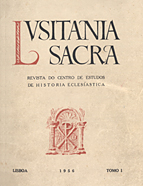

................................
The number of contributors grew significantly in this phase, exceeding 200. This growth reflects the increased interest in religious studies within the Portuguese historiographical landscape and the expansion of the CEHR’s network, which included both national and international researchers. Among these were academics from Spain, France, Mexico, and Brazil, underscoring the CEHR’s growing international reach.
Despite its limited use of illustrations, LS underwent numerous changes in print runs and unit costs during the 2nd Series. From volumes I to IV, 1,000 copies were printed by Barbosa & Xavier. Between volumes V and XVIII (1993–2006), print runs were reduced to 750 copies. For the biennial XIX–XX volume (2007–2008), only 600 copies were printed, though the number returned to 750 for the following volume. Volumes V–IX were printed by the UCP Publications Centre, while subsequent volumes were handled by Sersilito. Between volumes XXII and XXVI (2010–2012), the print run dropped to 500 copies, decreasing further to 400 copies for the last two volumes published (XXVII and XXVIII) in 2013. Regarding costs, subscription prices varied over time. The first two volumes were priced at 1,000$00 (escudos), rising to 4,000$00 for volume VII. After the introduction of the euro, the price stabilised at €20 per volume between volumes XII and XXII, before being reduced to €16 for volumes XXIII through XXVIII.
All volumes of LS are available and can be accessed free of charge.
Sources and Bibliography: Lusitania Sacra , 1ª e 2ª séries; particularmente, Tomo XXI (2009), 2.ª série – «Da História Eclesiástica à História Religiosa».; Luís Reis Torgal – «A história em tempo de “ditadura”». Luís Reis Torgal; José Amado Mendes; Fernando Catroga – História da História em Portugal, sécs. XIX-XX . Lisboa: Círculo de Leitores, 1996, p. 241-276.; Sérgio Campos Matos – «Historiografia II. Contemporânea». Carlos Moreira Azevedo (Dir.) – Dicionário de História Religiosa de Portugal . Lisboa: Círculo de Leitores, 2000, vol. 2, p. 368-374.
Sérgio Ribeiro Pinto
This work is financed by national funds through FCT - Foundation for Science and Technology, I.P, in the scope of the projects UIDB/04311/2020 and UIDP/04311/2020.
